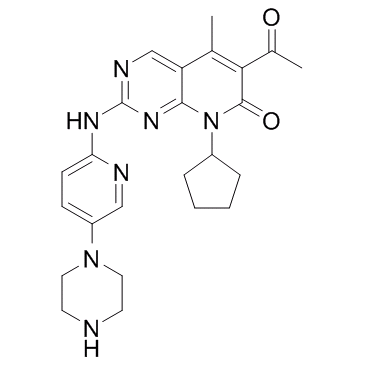All AbMole products are for research use only, cannot be used for human consumption.

In vitro: The IC50 of Palbociclib (PD 0332991) for reduction of retinoblastoma (Rb) phosphorylation at Ser780 in MDA-MB-435 breast carcinoma cells is 66 nM. Palbociclib is equally effective at reducing Rb phosphorylation at Ser795 in this tumor with an IC50 of 63 nM, and similar effects on both Ser780 and Ser795 phosphorylation are obtained in the Colo-205 colon carcinoma. The MP-MRT-AN (AN), KP-MRT-RY (RY), G401, and KP-MRT-NS (NS) cell lines are effectively inhibited by Palbociclib (PD) in a concentration-dependent manner in a WST-8 assay. The IC50s are 0.01 µM, 0.01 µM, 0.06 µM, and 0.6 µM, respectively. In contrast, the KP-MRT-YM (YM) cell line is resistant to Palbociclib (IC50>10 µM). The flow cytometry results show that Palbociclib at concentrations between 0 to 1.0 µM induces G1 arrest in the AN, RY, G401 and NS cell lines in a concentration-dependent manner, but has no effect on YM cells. The BrdU incorporation results are consistent with the WST-8 and flow cytometry results: PD reduces BrdU incorporation (indicating G1 arrest) in the AN, RY, G401 and NS cell lines, but not in the YM cell line. Palbociclib, even at a concentration of 0.05 µM, significantly reduces BrdU incorporation in the AN, RY, and G401 cell lines (p<0.05).
In vivo: Palbociclib (PD 0332991) exhibits significant antitumor efficacy against multiple human tumor xenograft models. In mice bearing Colo-205 colon carcinoma xenografts (p16 deleted), daily p.o. dosing for 14 days with Palbociclib (150 or 75 mg/kg) produces rapid tumor regressions and a corresponding tumor growth delay of ~50 days with >1 log of tumor cell kill at the highest dose tested. At 37.5 mg/kg, the tumor slowly regressed during treatment. Even at doses as low as 12.5 mg/kg, a 13-day growth delay is obtained indicating a 90% inhibition of tumor growth rate. Likewise, robust antitumor activity is seen in the MDA-MB-435 breast carcinoma (p16 deleted) where complete tumor stasis is apparent at 150 mg/kg and some cell kill is evident at the highest dose.

Patent. CN116832040A 2023 Oct 03.
Patent. CN116832040A
Palbociclib purchased from AbMole

NPJ Breast Cancer. 2022 Jan 10;8(1):1.
Effects of neoadjuvant trastuzumab, pertuzumab and palbociclib on Ki67 in HER2 and ER-positive breast cancer
Palbociclib purchased from AbMole
| Cell Experiment | |
|---|---|
| Cell lines | MRT cell lines |
| Preparation method | Palbociclib (PD) is prepared in DMSO and stored (−80°C), and then diluted with appropriate media before use. MRT cell lines, G401, MP-MRT-AN (AN), KP-MRT-RY (RY), KP-MRT-NS (NS), and KP-MRT-YM (YM) cell lines are seeded in normal growth medium into 96-well cell plates. After 24 h, the culture medium is replaced with culture medium containing Palbociclib (0.05 or 1 µM) or DMSO. |
| Concentrations | 0.05 or 1 µM |
| Incubation time | 24 h |
| Animal Experiment | |
|---|---|
| Animal models | Mice |
| Formulation | sodium lactate buffer |
| Dosages | 150 or 75 mg/kg |
| Administration | p.o. |
| Molecular Weight | 447.53 |
| Formula | C24H29N7O2 |
| CAS Number | 571190-30-2 |
| Solubility (25°C) | DMSO 10 mg/mL (Ultrasonic and warming and adjust pH to 5 with HCl and heat to 60°C) |
| Storage |
Powder -20°C 3 years ; 4°C 2 years In solvent -80°C 6 months ; -20°C 1 month |
[2] Turner NC, et al. N Engl J Med. Palbociclib in Hormone-Receptor-Positive Advanced Breast Cancer.
| Related CDK Products |
|---|
| (E/Z)-Zotiraciclib citrate
(E/Z)-Zotiraciclib citrate is a potent CDK2, JAK2, and FLT3 inhibitor. |
| Abemaciclib metabolites M2
Abemaciclib metabolite M2 (LSN2839567) is a metabolite of Abemaciclib, acts as a potent CDK4 and CDK6 inhibitor, with IC50 values of 1.2 and 1.3 nM, respectively. |
| CDK9-IN-1
CDK9-IN-1 is a novel, selective CDK9 inhibitor, with an IC50 of 39 nM for CDK9/CycT1, it can be used for the research of HIV infection. |
| XO44
XO44 (PF-6808472) is a broad-spectrum covalent kinase probe. |
| ML 315
ML 315 is a selective dual inhibitor of CDK and DYRK with IC50s of 68 nM and 282 nM, respectively. |
All AbMole products are for research use only, cannot be used for human consumption or veterinary use. We do not provide products or services to individuals. Please comply with the intended use and do not use AbMole products for any other purpose.


Products are for research use only. Not for human use. We do not sell to patients.
© Copyright 2010-2024 AbMole BioScience. All Rights Reserved.
